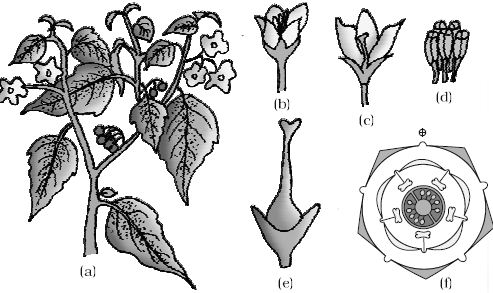Solanaceae is a large faintly, commonly called as the ‘potato family’. It is widely distributed in tropics, subtropics and even temperate zones (Figure).
Vegetative Characters: Plants mostly, herbs, shrubs and small trees
Stem: Herbaceous rarely woody, aerial: erect, cylindrical, branched, solid or hollow, hairy or glabrous, underground stem in potato (Solarium tuberosum).
Leaves: alternate, simple, rarely pinnately compound, exstipulate: venation reticulate.

Figure: Solanum nigrum (makoi) plant: (a) Flowering twig (b) Flower (c) L.S. of flower (d) Stamens (e) Carpel (I) Floral diagram
Floral Characters:
Inflorescence: Solitary, axillary or cymose as in Solanum
Flower: bisexual, actinomorphic
Calyx: sepals five, united, persistent, valvate aestivation
Corolla: Petals five, united; valvate aestivation
Androecium: stamens five, epipetalous
Gynoecium: bicarpellary, syncarpous; ovary superior, bilocular, placenta swollen with many ovules
Fruits: berry or capsule
Seeds: endosperm.
Economic Importance
Many plants belonging to this family are the source of food (tomato, brinjal, potato), spice (chilli): medicine (belladonna, ashwagandha); fumigatory (tobacco), ornamentals (petunia).











